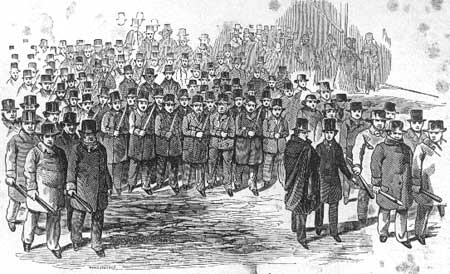talking history | syllabi | students | teachers | puzzle | about us
“Police conveying Sims to the vessel.”
The Fugitive Slave Law of 1850 placed the full weight of the federal government behind the apprehension of runaway slaves. This fact was best illustrated by the arrest of Thomas Sims, who escaped slavery in Georgia. Sims was arrested in Boston in April 1851 and, under the Fugitive Slave Law, returned to his owner. The city’s abolitionist movement agitated for his release and large crowds surrounded the courthouse in which Sims was incarcerated. But these efforts, which included plans to forcibly free the prisoner, did not succeed. This picture from a Boston illustrated weekly shows how Sims was conducted by three hundred armed police and marshals to a navy ship that carried him back to slavery. Upon his return south, Sims was sold to a new master in Mississippi. He escaped in 1863.

Source: Gleason’s Pictorial Drawing-room Companion, May 10, 1851—American Social History Project.
